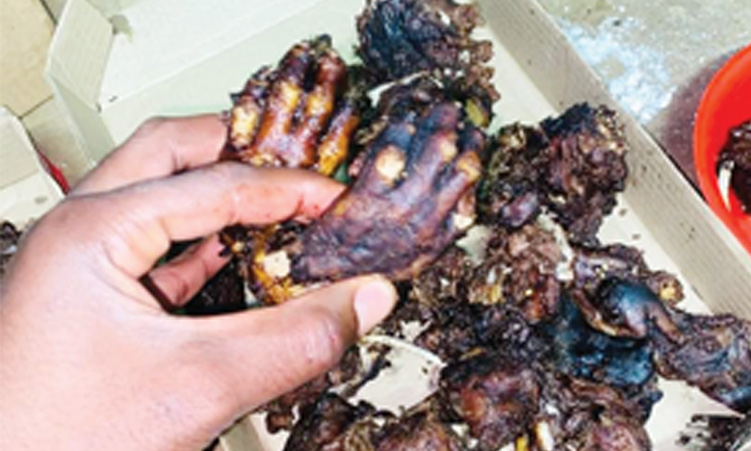Aune Thomas says she slaughters at least 20 dogs a week to keep up with the high demand for the “nutritious delicacy” at Omuthiya’s open market.
She says the demand for dog meat is high, but the supply is low.
“It is regarded as a delicacy in the north and loved by so many people. Because of its high demand, it is expensive to buy … The sales are really good,” Thomas says.
She says she is able to send her children to school with the money she earns from selling dog meat.
Vendors like Thomas often have to travel long distances across villages looking for people selling their dogs.
“A fully grown dog can be sold for about N$500, depending on its size and weight,” one vendor reveals.
The Namibian has witnessed several stalls at Omuthiya in the Oshikoto region and Oshakati in the Oshana region selling dog meat.
The trade seems unbothered by the recent outcry from animal rights activists calling for an end to the consumption of canine meat, following the theft and slaughtering of a dog named Dalton at Rehoboth last month.

TO EAT OR NOT TO EAT?
The Justice for Animals Trust has erected billboards in Windhoek, and at Ondangwa and Ongwediva in a bid to spread the message against eating dogs.
“We will not be bothered,” one dog meat lover has said about the billboards.
An online petition to end the practice of dog slaughtering has garnered 7 500 signatures to date.
Dalton, who was owned by Rehoboth resident Mavourneen Busch, was reported missing on 8 June.
Busch launched a social media campaign and door-to-door search to find her pet, only to discover him being dismembered and eaten at a market.
Ricardo Kastoor and Teodor Itembu have been arrested and charged with theft and animal cruelty in connection with the incident.
They remain in custody.
Two other suspects are still to be apprehended.
Thomas says she sometimes breeds dogs for slaughter.
“We do not steal or kill people’s dog on the streets to consume, because that is theft, and I guess one can be jailed for such an offence.
“We always buy our dogs from the owners. We do not steal dogs to consume them. That is wrong,” she says.
Lukas Shilongo, a dog meat lover from Oshakati, says dogs are important animals in the Owambo culture, and are considered as friends and even relatives.
However, they are also consumed for their “delicious and nutritious meat”, he says.
“We keep dogs in our houses as protectors, but once [a dog] reaches a certain stage, we kill it for its meat. Many people here enjoy dog meat, but there are also those who do not like dog meat and do not consume it at all,” he says.
A dog meat trader at Oshakati’s open market, Maria Stephanus, says she does not see why this practice should be banned.
“You can’t kill wild animals, because they’re endangered, and breeding more of them is difficult, but there are plenty of dogs. When they give birth, they usually have large litters of puppies. What is the legal reason why you shouldn’t be allowed to kill and eat a dog if you can kill and eat other animals?” she asks.
Dog meat lover Phillip Muneguni says the authorities will not prevent him from consuming dog meat.
“Dogs are our friends and we love them as pets just like all dog lovers. Why should we be subjected to what we should consume and not consume?
“Some people eat donkeys, rabbits and crocodiles, but we do not launch petitions calling for a ban on what they should consume or not consume. Eating dog meat should not even be up for discussion, this is a democratic country,” he says.

FRIEND, NOT FOOD
Meanwhile, Society for the Prevention of Cruelty to Animals (SPCA) operations director Sylvia Breiteinstein has expressed concern over the painful manner in which dogs are being slaughtered for consumption.
Breitenstein was speaking on Desert Radio yesterday.
She said while the SPCA has no problem with people eating dogs, the animal must not be beaten to death.
“We won’t say you can’t eat a cow, or you can’t eat a dog. We want the animals to be treated humanely. Stealing somebody’s animal is basically like poaching – it’s theft.
“The other thing is, in the case of Dalton, the dog was not consumed as a delicacy. The dog was cooked by the people and sold off. So, just from a plain moral point of view that is completely wrong,” she said.
Labour research expert Herbert Jauch says anti-dog consumption billboards disregard the area’s cultural context.
However, he says considering more people being affected by poverty and hunger, more dogs and cats will likely be consumed.
“I am saying that, because this week The Namibian carried a story in which the United Nations Food and Agricultural Organisation revealed that for the past two years Namibians have not had enough nutritious food.
“So, we have a massive crisis of poverty and hunger and even the government’s definition of poverty belittles the problem.
“If you do not address that, you will have a situation where people will increasingly have to eat whatever they come across,” he says.
Lawyer Fillemon Shikomba says the slaughtering of dogs in the north is a cultural issue.
“Context matters in this debate and I think enough context is not being applied in terms of the historical background and what is consumed – especially in the northern areas. Growing up in a community where people enjoy this delicacy, dog meat is not something that comes about easily.
“When the head of the family passes away, that is when a dog is killed. People don’t just kill dogs in the north for fun.
“It’s either the dog is promiscuous, and there is also a saying in my culture that when a dog makes a certain sound at night when it barks it releases a bad omen,” he says.
Stay informed with The Namibian – your source for credible journalism. Get in-depth reporting and opinions for
only N$85 a month. Invest in journalism, invest in democracy –
Subscribe Now!






